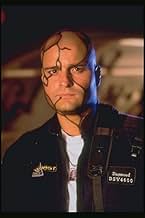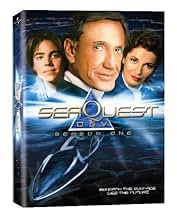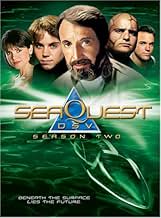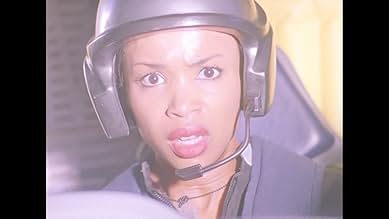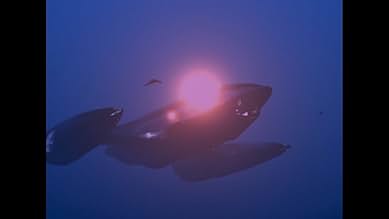Au début du 21e siècle, l'humanité a colonisé les océans. L'Organisation des Océans Unis fait appel au Capitaine Nathan Bridger et au sous-marin seaQuest DSV pour maintenir la paix et explor... Tout lireAu début du 21e siècle, l'humanité a colonisé les océans. L'Organisation des Océans Unis fait appel au Capitaine Nathan Bridger et au sous-marin seaQuest DSV pour maintenir la paix et explorer la dernière frontière sur la Terre.Au début du 21e siècle, l'humanité a colonisé les océans. L'Organisation des Océans Unis fait appel au Capitaine Nathan Bridger et au sous-marin seaQuest DSV pour maintenir la paix et explorer la dernière frontière sur la Terre.
- Récompensé par 2 Primetime Emmys
- 3 victoires et 5 nominations au total
Parcourir les épisodes
Histoire
Le saviez-vous
- AnecdotesDuring the original broadcast of the first season, during the end credits, Robert Ballard of the Woods Hole Institute would appear and speak about an aspect of current undersea research, usually related to the content of that episode. Ballard was also the technical advisor for the show and the discoverer of the wrecks of Titanic, Bismarck and Yorktown and someone who really has been in the ocean's depths.
- Crédits fousBrief profiles of sea-life conservation programs and efforts were shown during the closing credits of the first two seasons. 'Bob Ballard (I)' , the show's scientific advisor, narrated the first season segments; during the second year, cast members did the narration.
- Versions alternativesThe episode "Abalon" originally aired with Jimmy Buffett's "A Pirate Looks at Forty" playing in the background in a bar scene. In the R1 DVD release this song has been replaced by generic rock music.
- ConnexionsEdited into South Park: Go God Go XII (2006)
- Bandes originalesTo Be Or Not To Be
Commentaire à la une
The sad tale of seaQuest DSV should forevermore be inscribed into a producer's guide of "what not to do" to a TV series.
The first season was hands-down one of the greatest seasons of sci-fi adventure television ever. The premise, the characters, the writing, the acting, the production design, and even one of the most inspiring opening themes ever...
I was a huge fan of Star Trek: The Next Generation, and in many respects the first season of seaQuest DSV, airing opposite TNG's seventh season, was a more interesting show. It succeeded by not copying the Trek science fiction formula, but by complementing it, with a mythology grounded more in science fact than fiction. The series just exuded the feel of smart television, whether that feeling came from the subtle nods to current scientific research coming true or the almost Sorkinesque highbrow dialogue or Dr. Rob Ballard's involvement as a consultant.
And then, well, to adapt a common internetism, the show "triple backflipped over the shark."
Perhaps the one in the opening credits.
All of a sudden, four of the more interesting characters (those played by Applegate, Beacham, D'Aquino and Haiduk) vanished into thin air. The remaining cast were neutered to shells of their former selves. The show took a nosedive as far as plotting was concerned, and instead of thoughtful stories about real issues we got pulp culled from the worst of the worst of cruddy science fiction. Psychics! Laser guns! Time travel! Plants taking over the sub! Gigantic Crocodiles! Evil Aliens(tm)! Genetically-engineered slave warriors in skimpy wetsuits!
Wherever the show could have stunk, it did. NBC, still no doubt rather proud of the fact that they'd cancelled Star Trek twenty-five years earlier, wanted silly lowest-common denominator sci-fi to grab an even bigger share of the ratings. Unfortunately for NBC, as the ratings attested, even the lowest common demoninator of Americana really had no wish to have to endure an hour of second season sQ DSV.
There is some online opinion that show redeemed itself in its third season, although I personally feel that "seaQuest 2032" was no less odious than the year that had preceded it. After pushing the magic reset button as hard as they could following the events of the second-season cliffhanger finale, the writers essentially remade the show, turfing Scheider and any pretext that they'd attempt to tell smart television ever again. The show became a hammily-acted excuse of a drama, ditching the wide-eyed wonder of the first season and turning it into a geekfest of underwater shoot-em-ups with an evil bunch of pseudo-Australian pseudo-Fascists wrapped in a coat of paper-thin political intrigue(tm). Now more of an underwater Babylon 5 (and even that's being too kind) than an underwater Star Trek, I cried few tears when NBC put the show out of its misery.
So, for all you wanna-be producers out there, a few lessons: (1) If a show is smart and popular, consider the fact that making it dumb will probably make it unpopular. (2) Never, ever toss aside characters for no reason other than to get people who'd look better in a wetsuit. (3) I'll take a talking dolphin over a bald tattooed version of Forrest Gump anyday. (4) Despite what your polling data may tell you, submarine fighters are not cool. (5) If a friggin' genius like Rob Ballard has agreed to work on your show, you're doing something right. If said friggin' genius leaves your show and you replace him with Michael deLuise attempting to read fascinating facts about penguins off a teleprompter, you're doing something wrong.
The first season was hands-down one of the greatest seasons of sci-fi adventure television ever. The premise, the characters, the writing, the acting, the production design, and even one of the most inspiring opening themes ever...
I was a huge fan of Star Trek: The Next Generation, and in many respects the first season of seaQuest DSV, airing opposite TNG's seventh season, was a more interesting show. It succeeded by not copying the Trek science fiction formula, but by complementing it, with a mythology grounded more in science fact than fiction. The series just exuded the feel of smart television, whether that feeling came from the subtle nods to current scientific research coming true or the almost Sorkinesque highbrow dialogue or Dr. Rob Ballard's involvement as a consultant.
And then, well, to adapt a common internetism, the show "triple backflipped over the shark."
Perhaps the one in the opening credits.
All of a sudden, four of the more interesting characters (those played by Applegate, Beacham, D'Aquino and Haiduk) vanished into thin air. The remaining cast were neutered to shells of their former selves. The show took a nosedive as far as plotting was concerned, and instead of thoughtful stories about real issues we got pulp culled from the worst of the worst of cruddy science fiction. Psychics! Laser guns! Time travel! Plants taking over the sub! Gigantic Crocodiles! Evil Aliens(tm)! Genetically-engineered slave warriors in skimpy wetsuits!
Wherever the show could have stunk, it did. NBC, still no doubt rather proud of the fact that they'd cancelled Star Trek twenty-five years earlier, wanted silly lowest-common denominator sci-fi to grab an even bigger share of the ratings. Unfortunately for NBC, as the ratings attested, even the lowest common demoninator of Americana really had no wish to have to endure an hour of second season sQ DSV.
There is some online opinion that show redeemed itself in its third season, although I personally feel that "seaQuest 2032" was no less odious than the year that had preceded it. After pushing the magic reset button as hard as they could following the events of the second-season cliffhanger finale, the writers essentially remade the show, turfing Scheider and any pretext that they'd attempt to tell smart television ever again. The show became a hammily-acted excuse of a drama, ditching the wide-eyed wonder of the first season and turning it into a geekfest of underwater shoot-em-ups with an evil bunch of pseudo-Australian pseudo-Fascists wrapped in a coat of paper-thin political intrigue(tm). Now more of an underwater Babylon 5 (and even that's being too kind) than an underwater Star Trek, I cried few tears when NBC put the show out of its misery.
So, for all you wanna-be producers out there, a few lessons: (1) If a show is smart and popular, consider the fact that making it dumb will probably make it unpopular. (2) Never, ever toss aside characters for no reason other than to get people who'd look better in a wetsuit. (3) I'll take a talking dolphin over a bald tattooed version of Forrest Gump anyday. (4) Despite what your polling data may tell you, submarine fighters are not cool. (5) If a friggin' genius like Rob Ballard has agreed to work on your show, you're doing something right. If said friggin' genius leaves your show and you replace him with Michael deLuise attempting to read fascinating facts about penguins off a teleprompter, you're doing something wrong.
Meilleurs choix
Connectez-vous pour évaluer et suivre la liste de favoris afin de recevoir des recommandations personnalisées
Détails
- Date de sortie
- Pays d’origine
- Langue
- Aussi connu sous le nom de
- SeaQuest 2032
- Lieux de tournage
- Sociétés de production
- Voir plus de crédits d'entreprise sur IMDbPro
Contribuer à cette page
Suggérer une modification ou ajouter du contenu manquant

Lacune principale
By what name was SeaQuest, police des mers (1993) officially released in India in English?
Répondre

